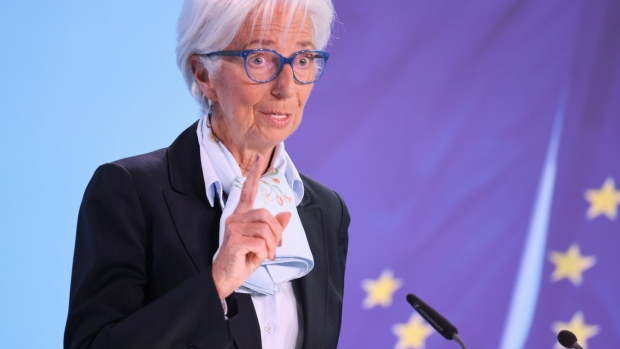Apr 11, 2024
Lagarde Feels Pull of Fed’s Tractor Beam as ECB Plans Rate Cut
, Bloomberg News

(Bloomberg) -- European Central Bank chief Christine Lagarde is striking a less defiant tone on the influence of Federal Reserve policy even as she firms up plans to go it alone with an interest-rate cut.
Despite weeks of debate by colleagues on a path of future easing, the euro-zone monetary president on Thursday refrained from speculating much beyond a prospective move in June — and paid greater lip service than in March to the gravitational pull of events in the US.
“The United States is a very large market, a very sizable economy, a major financial center as well, so all that finds its way into our projections,” Lagarde told journalists in Frankfurt, shortly after insisting that “we are data dependent — we are not Fed dependent.”
Such remarks offer more nuance than the ECB did last time, when she insisted that “we will determine what action we need to take,” while her colleague Olli Rehn then declared that “the ECB is not the Fed’s ‘13th Federal District.’”
Lagarde spoke after the ECB signaled that it’s preparing for a rate cut at its next meeting, a prospect that could mean the euro zone eases first, well before the US. While that might point to a parting of ways, officials added that even if borrowing costs do fall, they’re “not pre-committing to a particular rate path” — a comment they didn’t include last time round.
Faster-than-anticipated US inflation data on the eve of the decision have prompted global repricing as investors trim bets on rate reductions. The euro hit a two-month low after the ECB decision, underscoring how the possibility of transatlantic policy divergence is stirring financial markets.
Weak momentum in the euro region, along with sticky price growth in the US, is leading investors to reckon that such a scenario is increasingly plausible.
“The message of the data is clear: the euro zone needs rate cuts, the US economy does not, as long as the pre-election fiscal expansion neutralizes the impact of high Fed rates,” economist Holger Schmieding at Berenberg said in a note.
He now thinks US officials could end up moving six months after the ECB does on June 6 — an unusual outcome, but one justified by their diverging economic performances.
Speaking just before the decision, Allianz Chief Economist Ludovic Subran stressed that even if a rate cut is entirely warranted, the ECB’s room for maneuver is limited by the “US financial vortex.”
He reckons the Fed staying on hold at the same time as 100 basis points of cuts in the euro zone could lead to a “quite massive” 4-5% drop in the euro. Even lowering rates by half that amount would be “quite a bold move,” he added.
Lagarde refused to be drawn much on the currency’s influence on policy.
“We don’t target exchange rate, we don’t comment on the exchange rate and I’m not going to go any further than that,” she said. “I would simply mention that there are multiple channels through which influence can be exercised, it’s not just through exchange rates.”
--With assistance from Jana Randow, Mark Schroers and Bastian Benrath.
©2024 Bloomberg L.P.






